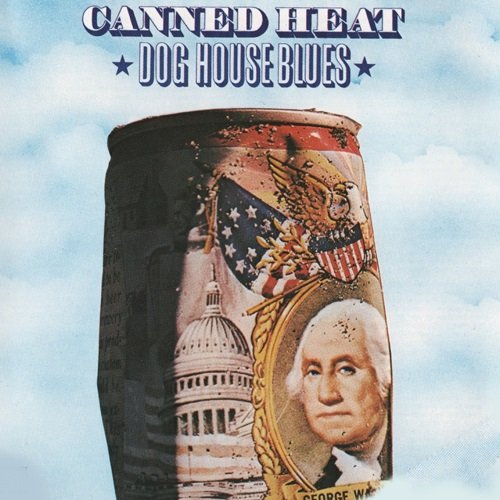Conceived as a blues revivalist group specializing in excavating pre-war gems, Canned Heat anchored their authentic inclinations with a heavy boogie that suited the hippie era. Their ear for blues classics and facility for droning blues jams made them ideal choices for the bills at both Monterey Pop and Woodstock. Their appearance at the latter festival arrived a year after the band had two surprise hit singles with "On the Road Again" and "Going Up the Country" -- two country-blues numbers the Heat modernized thanks in part to Alan "Blind Owl" Wilson's idiosyncratic phrasing. Wilson died just as the band settled into a groove, leaving fellow lead singer Bob "The Bear" Hite to shepherd Canned Heat through the end of the '70s. After Hite's death in 1981, drummer Adolfo "Fito" de la Parra anchored Canned Heat through a revolving lineup that stretched all the way into the 2020s, when they released the farewell Finyl Vinyl.
A pair of passionate blues record collectors, Bob "The Bear" Hite and Alan "Blind Owl" Wilson formed Canned Heat in Los Angeles in 1965. Initially a jug band, the group drifted toward electrification as its lineup solidified. By early 1966, Hite and Wilson added guitarist Henry Vestine, a refugee from the Mothers of Invention, and Frank Cook, a drummer with a jazz background. With bassist Stu Brotman in tow, these four musicians cut an album with legendary R&B producer Johnny Otis but the results were shelved; they'd later come out in 1970 as Vintage Heat. Brotman left the band after these sessions, and after a brief flirtation with Mark Andes (who would later join Spirit), the band settled on Larry Taylor as his replacement.
Canned Heat released their eponymous debut -- a record comprised entirely of covers, including such standards as "Rollin' and Tumblin'," "Dust My Broom," and "Goin' Down Slow," in July 1967. The same month, they played the Monterey Pop Festival and would be featured in D.A. Pennebaker's film of the festival. Not long after the album's release, Frank Cook swapped places with Adolfo de la Parra, who had been drumming in Bluesberry Jam, a group that soon became Pacific Gas & Electric.
With de la Parra aboard, Canned Heat recorded Boogie with Canned Heat, a 1968 LP that featured a hazy, funky "On the Road Again," a hybrid of a pair of Tommy Johnson and Floyd Jones tunes that was sung by Alan Wilson. "On the Road Again" became a surprise hit, reaching 16 on the Billboard charts. The group quickly followed it with the cheerful "Going Up the Country," a tune that blended a couple of songs by Henry Thomas. Again sung by Alan Wilson, "Going Up the Country" was another big hit, almost cracking Billboard's Top Ten. The two hits gave Canned Heat momentum going into Woodstock, the landmark 1969 festival where they played one of the weekend's stellar sets.
Living the Blues, the 1968 album "Going Up the Country" called home, reached 18 on the Billboard charts and its 1969 sequel Hallelujah performed well, reaching 37. Shortly afterward, Canned Heat encountered some rough times. Vestine left after Hallelujah and Harvey Mandel stepped into his shoes on Future Blues, a 1970 album highlighted by a high-octane version of Wilbert Harrison's "Let's Work Together" sung by Hite; it became the group's last Top 40 hit, reaching 26. A month after the record's release Wilson died of an accidental barbiturate overdose on September 3, 1970.
Canned Heat had some material in the can when Wilson died, including Canned Heat '70 Concert Live in Europe and part of Hooker 'N Heat, a double-LP the band cut with their idol John Lee Hooker. Vestine returned to play on Hooker 'N Heat and he wound up replacing Mandel, staying with Canned Heat through Historical Figures and Ancient Heads and The New Age, a pair of records the band released on United Artists in the early '70s, as well One More River to Cross, the 1973 album on Atlantic that became the group's last for a major label.
Hite fronted rotating lineups of Canned Heat through the rest of the '70s. They rarely cut new albums -- 1978's Human Condition was the exception to the rule -- but they stayed active as a live unit Hite's death after an on-stage collapse in Los Angeles on April 5, 1981. de la Parra continued Canned Heat with Richard Kellogg on vocals and Walter Trout on guitar.
Under de la Parra's direction, members flowed in and out of the group. James Thornbury became their lead vocalist/guitarist in 1985, Henry Vestine returned for a spell in the '80s, as did Larry Taylor; the latter played on Reheated, the 1988 slab that was the band's first new album in a decade. By the time the group released Internal Combustion in 1994, Taylor was gone, but Vestine came back to play in the mid-'90s. He appeared on 1996's Canned Heat Blues Band -- the record where Robert Lucas made his debut as the band's vocalist -- but died a year later.
Larry Taylor returned for 1999's Boogie 2000 but by 2003's Friends in the Can, de la Parra was leading a group that featured vocalist/guitarist Dallas Hodge and guitarist John Paulus. Harvey Mandel played with the group during the late 2000s and early 2010s, as did Larry Taylor, but by the 2020s, they were gone. The latter-day lineup featured mainstay de la Parra, guitarist/keyboardist Jimmy Vivino, vocalist/guitarist/harmonicaist Dale Wesley Spalding, and bassist Rick Reed. This lineup cut Finyl Vinyl, the 2024 album that was intended as the band's farewell to recording.




